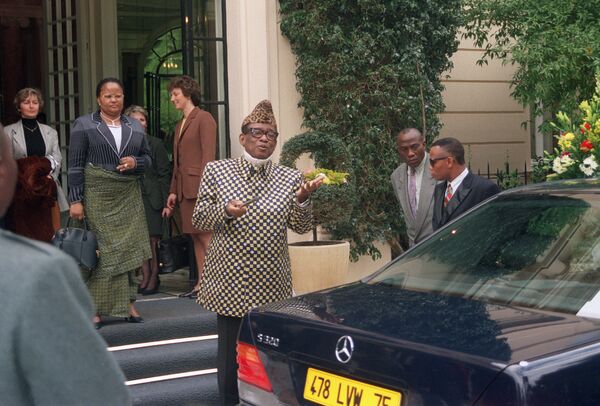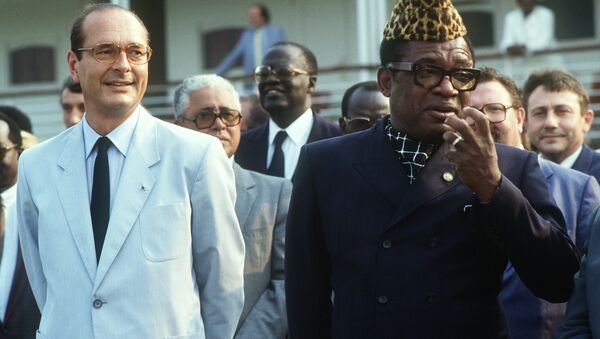The money was taken from the coffers of the country, now called the Democratic Republic of Congo, and the last of it — a paltry US$7 million — was unfrozen from a Swiss bank account and given back to the Mobutu family in 2009.
In his recent book, Dictatorland, journalist Paul Kenyon explored Mobutu's rise to power as an ally and puppet of the United States and how he amassed his ill-gotten wealth by raiding the state coffers.
Mobutu was ousted in 1993 by Laurent Kabila's rebels, who were backed by neighbouring Uganda and Rwanda.
"Mobutu had fled within hours of Kabila's victory, flying Togo to Morocco, into permanent exile. He had amassed a fortune of $5 billion during his three decades in office, much of it hidden in Swiss, Belgian and American bank accounts," Kenyon wrote.
Judge Ellis: "Manafort led a blameless life before this." This is the man who whitewashed the blood spilled by Mobutu, Jonas Savimbi, and the Marcos family.
— Jeffrey St. Clair (@JSCCounterPunch) 7 March 2019
"Much of the money has never been recovered. Some disappeared quietly into the crepuscular world of lawyers, bankers and offshore shell companies. A proportion found its way into the hands of his dozen or so children," Kenyon added.
Mobutu's Son Became Political Ally of DR Congo President
Mobutu died in 1997 but ironically Kabila's son Joseph later became President and ironically one of Mobutu's sons, Nzanga, ended up as an ally of Kabila.
Mark Pieth, a Swiss professor of criminal law, said Mobutu had stolen US$30 billion over his 30 years in power but much of it he used to oil the wheels of power and pay off political and military allies.
"But he would have had a nest egg. The Mobutu family are still wealthy and a lot of lawyers made a living off it," Prof Pieth told Sputnik.
Professor Pieth said he stepped in when the Swiss federal attorney's office showed little interest in freezing the remaining $7 million in 2009.
"We said he was an organised criminal and he should forfeit it. My suggestion was that the money should go to the Medecins sans Frontieres, who were dealing with the consequences of war in eastern Congo, but then something weird happened," Prof. Pieth told Sputnik.
In our upcoming Spring issue, War & Peace, @richardalijos interviews journalist and author, @paulkenyonTV. Panorama aims to break the boundaries of not only what travel writing is, but what conversations about travel look like. pic.twitter.com/mduRwzT4g7
— Panorama Journal (@Panorama_J) 6 February 2019
"The lawyer appealed and Kabila — who is allied to Mobutu's son — said ‘don't bother, it's only $7 million.' I'm just a citizen but I got angry and I put in an citizen's appeal. The money was going to be freed four days later and Mobutu's widow was on the doorstep waiting for the money. I wrote to seven ministers in Switzerland and said 'keep it frozen.' They don't usually react to citizens but they agreed to a six month freeze. After that the federal tribunal and they gave it to the widow," Prof Pieth told Sputnik.

Prof Pieth said he was less than impressed by the efforts of the Swiss federal attorney's office in seeking to repatriate embezzled funds from foreign countries.
"Swiss law is ambiguous. The law should help to repatriate stolen funds. In some cases, such as Haiti's (Baby Doc) Duvalier they were quite proactive but it's not always the case. The Swiss government is trying to do things but the prosecutors were inactive. It's a very missed story. They are making a lot of big noises about stolen money but there is a long history of taking stolen money from kleptocratic dictators," Prof Pieth told Sputnik.
In the 1970s, Dictator Mobutu Sese Seko, leader of what was then Zaire, spent £250m building a luxurious palace complex for himself at Gbadolite, the village his family came from. pic.twitter.com/Sos1QGUGyC
— Eric (@amerix) 11 November 2017
He said Equatorial Guinea was another country whose President Teodoro Obiang Nguema and his playboy son Teodorin have become fabulously wealthy on the back of an oil boom but have not shared the money with their citizens, who remain largely impoverished.
Dodgy Deal Over $100 Mln Yacht
In February this year the Swiss authorities reached a deal over a yacht, the Ebony Shine, which was impounded in the Netherlands.
"Switzerland struck a deal and said if you leave $1.5 million and 25 luxury cars we'll free your yacht, which was worth $100 million," Prof Pieth told Sputnik.
Prof Pieth works closely with the International Centre for Asset Recovery (ICAR) in Basle, which has around 80 affiliates around the world — including the Metropolitan Police and the Crown Prosecution Service in the UK — who are involved in tracking down ill-gotten wealth from political and military leaders.
Talk Africa: Conversation with Equatorial Guinea's President Obiang https://t.co/sx3JxoiFx1 Visit Lucid to view previous processed videos. pic.twitter.com/wCadr1iSL4
— Invacio Analytica (@Invacio) 15 April 2019
He said Britain, Switzerland and Liechtenstein were funding ICAR and he said those three countries were making it harder for embezzlers to hide their money in their banking systems.
But he said the Panama Papers had exposed the internationalisation of the money laundering and hidden assets business.
"People are still stealing and they find allies. They are moving to different places, like Malta or Cyprus. Switzerland or Liechtenstein are too controlled nowadays. Malta is a better bet," Prof Pieth said, highlighting the 2017 murder of journalist Daphne Caruana Galizia, who was investigating money laundering and property transactions on the island.
a “resource curse”, as oil distorts economies, corrupts politics and fuels wars. Now some warn of a “presource curse”, which strikes even before the first drop is pumped. @TheEconomist https://t.co/XqlCbbWZuU #Mindspeak: @KagutaMuseveni https://t.co/U4MmkgCiRE
— Aly-Khan Satchu (@alykhansatchu) 8 April 2019
"They no longer bank in Switzerland. You maybe use a Swiss lawyer to organise the thing for you. He will buy a company in the British Virgin Islands and open a bank account in Cyprus. There is no Geneva connection except that he has legal privilege," Prof Pieth told Sputnik.
What is The Resource Curse?
He said many of the countries which had the worst corruption and embezzlement were those which were blessed with mineral wealth.
"It's known as The Resource Curse. Resource-rich places where the riches are systematically siphoned off. Angola is another example. Anywhere where you have diamonds, gold, copper, oil," Prof Pieth told Sputnik.
After the Panama Papers scandal broke in 2016 Prof Pieth and Joseph Stiglitz, the Nobel prize-winning economist, were asked by the country's President, Juan Carlos Varela, to examine what could be done to prevent a repetition.
"We went there and made suggestions. They just kicked us out and aborted the exercise prematurely. I think they were naïve," Prof Pieth told Sputnik, adding that they did not even have the nous to commission a report and then shelve its recommendations.
The views and opinions expressed in this article are solely those of the speaker and do not necessarily reflect Sputnik's position.

